Mayor Hamilton Green has a plan to raise some $400M to restore the historic City Hall to its pre-Independence glory and it might involve the public picking up the bill but not everyone is thrilled with the idea.
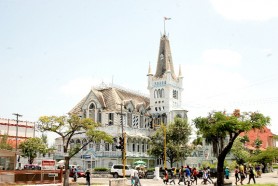
According to Director of Culture, Professor James Rose, that kind of civic-mindedness fled with colonialism, but he would be open to a coherent restoration plan which has been costed to submit to the funding agencies.
In an interview with this newspaper recently Green said he has already drafted letters to citizens and others in the diaspora seeking assistance, but he has held off dispatching them because of the present environment of “confusion” at City Hall. According to him, he is awaiting “the right time” to launch his appeal.
“I’m waiting for a less stressful period because I’ve asked them to give me an estimate [and] it’s going to cost a lot of money. It’s something like over $400M.”
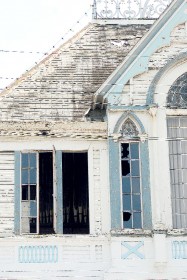
The mayor says he is looking to have the entire complex restored which is a very technical process and requires an expert with the architectural experience used to construct the facility.
“I’ve asked Professor Rose to identify someone who can come, because I don’t think our engineers have the experience. They can do what they call rehabilitation works but to do restoration is a different thing; it calls for experience particularly with an old British-built building.”
Addressing the Concert Hall specifically, Green said they had done work to fix the leaks and the windows but those were just repairs; he wants a mirror-image of the hall he played in as a boy.
“Take, for example, the columns, you just don’t replace them, you have to get
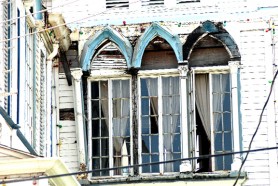
that exact wood there. It’s a tedious thing, we’ve already bastardised the Concert Hall. It’s one of our heritage buildings and it’s the kind of thing I hoped the government would have taken on that and St George’s Cathedral; it’s a heritage building,” Green declared.
The mayor is optimistic that people will respond positively to his appeal, a sentiment Dr Rose does not share.
“In the 1940s that might have happened; we don’t have that kind of community any longer.
Those people have visas to the US and Canada. That inner pride to make a donation that would be sensible doesn’t exist any longer. The people with the money would faster purchase City Hall, break it down and put up a concrete box,” the director stated.
He added that it pained the administration to see the state of City Hall which he described as “one of our most treasured buildings.
“You know what happens in Guyana, you have a little leak and we wait until
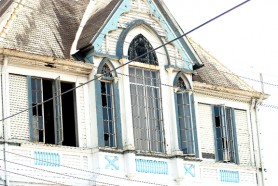
that leak becomes bigger. What could have been fixed with $5 dollars will now cost $5,000. We don’t sustain maintenance schedules. The private citizens maintain their buildings but the city allows buildings to fall down then takes World Bank money to fix them.”
According to Dr Rose, they wanted the facility restored, but the problem was the cost attached, one he said the city could not afford. He added that even doing the restoration incrementally would be unfeasible since that would likely run for about five years by which time the building might fall down.
“Our best bet would be to get a restoration plan, work out costing and a realistic schedule and go to the funding agencies. We are prepared to side with them but they’ve got to get the documentation right,” Dr Rose stated.
The director, who heads the National Trust of Guyana, said he suspects the city has a first draft of a plan in place but he does not think it has gone beyond that. However, he did not dismiss the mayor’s appeal idea totally.
“I don’t think it’s realistic. By all means do it but I think they will ask questions about the avenues pursued to raise this money. The people with the 1940s and 1950s civic-mindedness now live in places like Toronto.”
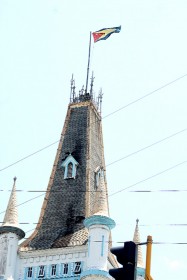
In 1977 Guyana acceded to the Convention Concern-ing the Protection of the World Cultural and Natural Heritage that was adopted by UNESCO in 1972, a treaty which addresses the conservation and protection of natural and cultural heritage sites of the world. From the mid-1990s Guyana made three nominations for World Heritage Site status, namely the Kaieteur National Park, Shell Beach and Historic Georgetown. However, none of those submissions have been successful to date.
A ‘Tentative List’ indicating an intention to nominate Historic Georgetown was submitted to UNESCO in December 2004 and a small committee, which has not been functioning, was formed to complete the nomination dossier and the management plan for the site. That list includes City Hall. Two Dutch experts, including Dr Ron van Oers, who also worked with Suriname in preparing the country’s successful nomination, assisted in preparing Guyana’s dossiers.
And in April 2005, two Dutch experts in conservation spent two weeks in Georgetown supervising architecture staff and students of the University of Guyana in a historic building survey of the selected area. This is part of the data collection for the nomination dossier.




